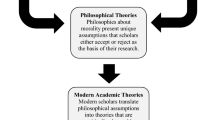Abstract
Public accounting in the United States is generally guided by the Code of Professional Conduct of the American Institute of Certified Public Accountants (AICPA). It has been suggested that education in understanding and accepting their ethical code would increase accountants' adherence and ethicality.
This study was designed to examine the level of consensus to AICPA ethical standards by accounting students (ethical orientation). Situation ethics provided the theoretical rationale for this study.
The data were gathered by contacting colleges in the New York Metropolitan Area who offered curriculums which were registered by the State Education Department of New York State for Certified Public Accountancy preparation. The final sampling units for this study consisted of 306 beginning accounting students and 294 advanced accounting students. Included in the secondary sampling units were both private and public colleges, secular and non-secular colleges, and American Assembly of Collegiate Schools of Business (AACSB) and non AACSB-accredited colleges. Three instruments were used to collect data for this study: a student demographic questionnaire; the Rokeach Value Survey (RVS); and a researcher-adapted questionnaire, the Index of Ethical Congruence (IEC) which measured the level of consensus to the AICPA Code of Conduct (ethical orientation).
T-tests were used to compare the levels of consensus to the Code (IEC score) between beginning and advanced accounting students, and between accounting students who had, or had not, taken a course in ethics. No significant difference in scores were found for those students who had been exposed to the Code or who had taken a course in ethics. Significant differences in IEC scores were found for those students who had attended AACSB-accredited colleges and meaningful differences for those students who had attended public colleges as compared to private colleges.
Multiple regression analyses were used to test the relationship between the ethical orientation score (IEC) and personal values measured by the RVS. No relationship between personal values measured by the RVS and ethical orientation was found by this study.
This study does not support the influence of situation on ethical orientation. The results indicate that ethical orientation is not significantly improved through exposure to the AICPA Code of Conduct in collegiate courses in accounting.
Similar content being viewed by others
References
Accounting Education Change Commission: 1990, Position Statement No. One: Objectives of Education for Accountants (Torrance, CA).
American Assembly of Collegiate Schools of Business: 1987, 1987–1988 Accreditation Council Policies, Procedures and Standards.
American Institute of Certified Public Accountants: 1990, Professional Standards, Vol. 2, Code of Professional Conduct, As Adopted January 12, 1988 (Commerce Clearing House, Chicago).
Armstrong, M.: 1984, Internalization of the Professional Ethic by Certified Public Accountants: A Multidimensional Scaling Approach (Unpublished doctoral dissertation, University of Southern California).
Baumhart, R.: 1968, Ethics in Business (Holt, Rinehart, and Winston, New York).
Beets, S. D.: 1992, ‘The Revised AICPA Code of Professional Conduct: Current Considerations’, The CPA Journal 62(4), 26–32.
Brief, A. P., P. R. Brown, J. Dukerich and J. F. Brett: 1993, ‘What's Wrong With The Treadway Commission Report? Experimental Analyses of the Effects of Personal Values and Codes of Conduct on Fraudulent Financial Reporting’, Manuscript submitted for publication.
Byrd, S. D.: 1979, The Arkansas Certified Public Accountant and the American Institute of Certified Public Accountant's Code of Professional Ethics (Unpublished doctoral dissertation, University of Arkansas).
Carey, J. L.: 1956, Professional Ethics of Certified Public Accountants (American Institute of Certified Public Accountants, New York).
Davis, R. R.: 1984, ‘Ethical Behavior Reexamined’, The CPA Journal 54(12), 32–36.
Loeb, S. E.: 1971, ‘A Survey of Ethical Behavior in the Accounting Profession’, Journal of Accounting Research 9, 287–306.
Loeb, S. E.: 1970, A Behavioral Study of CPA Ethics (Unpublished doctoral dissertation, University of Wisconsin).
Mayer-Sommer, A. P. and S. E. Loeb: 1981, ‘Fostering More Successful Professional Socialization Among Accounting Students’, The Accounting Review 56, 125–136.
Pamental, G. L.: 1989, ‘Ethics in Introductory Accounting’, Journal of Education for Business 64, 179–181.
Rest, J.: 1987, ‘Can Ethics Be Taught To Adults?’, Handbook of the Western Region American Accounting Association, 80–84.
Rokeach, M.: 1973, The Nature of Human Values (The Free Press, New York).
Rokeach, M.: 1967, Value Survey (Consulting Psychologists Press, Palo Alto, CA).
Sellers, J. H. and E. E. Milam: 1979, ‘Ethical Perceptions of Accounting Students’, Collected Papers of the American Association's Annual Meeting, 635–644.
Shaub, M. K.: 1988, ‘Restructuring the Code of Professional Ethics: A Review of the Andersen Committee Report and Its Implications’, Accounting Horizons, 2(4), 89–97.
The Hastings Center: 1980, The Teaching of Ethics in Higher Education (Institute of Society, Ethics and the Life Sciences, New York).
Thielens, W., Jr.: 1966, Recruits for Accounting (Bureau of Applied Social Research, Columbia University, New York.
Touche Ross: 1988, Ethics in Business: An Opinion Survey of Key Business Leaders on Ethical Standards and Behavior (Touche Ross, New York).
Author information
Authors and Affiliations
Rights and permissions
About this article
Cite this article
McCarthy, I.N. Professional Ethics Code Conflict Situations: Ethical and Value Orientation of Collegiate Accounting Students. Journal of Business Ethics 16, 1467–1473 (1997). https://doi.org/10.1023/A:1005780402378
Issue Date:
DOI: https://doi.org/10.1023/A:1005780402378




